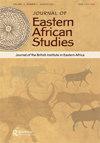暂停破坏:保留肯尼亚花卉农场的模糊潜力
IF 0.6
3区 社会学
Q2 AREA STUDIES
引用次数: 2
摘要
摘要本文关注奈瓦沙的一个花卉农场的财务崩溃以及随后的物质恶化与维护之间的相互作用,该农场于2014年被置于破产保护之下。我们的研究是基于三位作者在农场崩溃之前、期间和之后进行的人种学田野调查。我们研究了下岗工人、在职员工、业主和新管理层如何参与我们称之为“暂停破产”的过程,在这个过程中,农场既不会崩溃,也不会完全恢复到原来的状态。农场基础设施的维护创造了一种暂停状态,其特征是潜在的不透明信息——接收方想要转售房产的意图,以及前雇员对获得高额补偿的期望,都强化了这一过程。我们的文章研究了他们如何照顾看似“废墟”的做法,将农场作为资本主义潜力的模糊对象,补充了正在进行的关于废墟的研究,受到资本主义未来制定议程的煽动。本文章由计算机程序翻译,如有差异,请以英文原文为准。
Suspending ruination: preserving the ambiguous potentials of a Kenyan flower farm
ABSTRACT
This article focuses on the financial collapse of and the subsequent interplay between material deterioration and maintenance on a flower farm in Naivasha that was placed under receivership in 2014. Our research is based on ethnographic fieldwork conducted by the three authors before, during, and after the farm’s collapse. We examine how laid-off workers, current employees, owners, and new management engage in a process we call ‘suspending ruination’, in which the farm is neither left to collapse nor fully restored to its original state. Maintaining the farm’s infrastructure creates a state of suspension characterised by opaque messages of potential – a process reinforced by both the receivers’ intent to resell the property, as well as the former employees’ anticipation of receiving outstanding compensations. Examining how their practices of caring for what appears to be a ‘ruin’ uphold the farm as an ambiguous object of capitalist potential, our article complements ongoing research on ruinations, instigated by capitalism's future-making agendas.
求助全文
通过发布文献求助,成功后即可免费获取论文全文。
去求助
来源期刊

Journal of Eastern African Studies
AREA STUDIES-
CiteScore
3.30
自引率
7.10%
发文量
12
期刊介绍:
Journal of Eastern African Studies is an international publication of the British Institute in Eastern Africa, published four times each year. It aims to promote fresh scholarly enquiry on the region from within the humanities and the social sciences, and to encourage work that communicates across disciplinary boundaries. It seeks to foster inter-disciplinary analysis, strong comparative perspectives, and research employing the most significant theoretical or methodological approaches for the region.
 求助内容:
求助内容: 应助结果提醒方式:
应助结果提醒方式:


